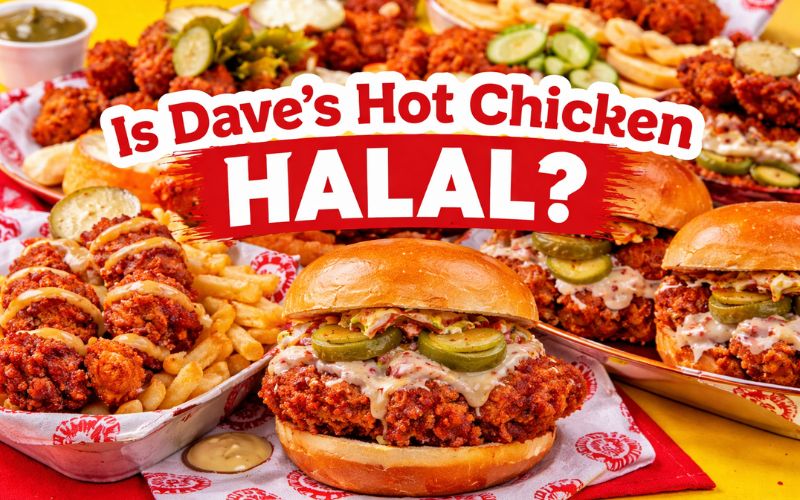Dave’s Hot Chicken has rapidly grown into one of the most talked‑about fast‑casual restaurant chains in North America and beyond. Known for its Nashville‑style hot chicken, bold spice levels, and simple menu, the brand has attracted a diverse customer base, including Muslim consumers who want to know whether the food meets halal dietary requirements.
Questions about halal status are common whenever a fast‑growing restaurant expands into new regions or franchises its operations. Since halal compliance involves sourcing, slaughter methods, ingredient handling, and cross‑contamination controls, the answer is not always straightforward. Some locations may offer halal chicken, while others may not, depending on ownership and suppliers.
Understanding What Halal Means in Fast Food
Before determining whether Dave’s Hot Chicken is halal, it is important to understand what halal requires in the fast‑food industry.
Core Halal Requirements
Halal food must meet the following conditions:
- Animals must be slaughtered according to Islamic guidelines (Zabiha)
- The name of Allah must be recited at slaughter
- Blood must be fully drained
- Pork and pork by‑products are strictly prohibited
- Alcohol and intoxicants cannot be used in preparation
- Cross‑contamination with non‑halal items must be avoided
Related Post: Is Burger King Halal?
Why Fast Food Halal Status Varies
Fast‑food chains often operate on franchise models. This means:
- Different suppliers may be used
- Certification may vary by location
- Kitchen practices differ
- Regional demand influences halal sourcing
Because of this, one branch may serve halal chicken while another does not.
Overview of Dave’s Hot Chicken Menu
Dave’s Hot Chicken focuses on a limited but specialized menu built around hot fried chicken.
Main Menu Categories
| Category | Examples | Halal Concern Level |
| Chicken Tenders | Hot chicken tenders | Depends on sourcing |
| Chicken Sliders | Chicken with buns & sauce | Depends on chicken & bread |
| Fries | Crinkle‑cut fries | Usually halal |
| Mac & Cheese | Cheesy side dish | Ingredient verification needed |
| Kale Slaw | Vegetable side | Generally halal |
| Sauces | Dave’s sauce, honey, etc. | Check for alcohol additives |
The halal status mainly depends on the chicken supplier and cooking process.
Is Dave’s Hot Chicken Halal in the United States?
In the United States, Dave’s Hot Chicken is not universally halal.
Key Points
- Most U.S. locations do not advertise halal certification
- Chicken is typically sourced from conventional suppliers
- Cross‑contamination risk exists in shared fryers
- No nationwide halal policy is in place
However, exceptions may exist.
Halal‑Serving Locations
Some franchise owners choose halal suppliers due to local Muslim demand. These locations may:
- Display halal certificates
- Source Zabiha‑slaughtered chicken
- Use separate preparation areas
Always confirm directly with the branch.
Is Dave’s Hot Chicken Halal in Canada?
Canada has more halal‑friendly fast‑food adaptation due to its multicultural population.
Observations in Canadian Branches
- Some Ontario locations have offered halal chicken
- Halal signage may be displayed in stores
- Staff often confirm halal sourcing when asked
Verification Is Still Necessary
Even within Canada:
- Not all branches are halal
- Certification bodies may differ
- Supply chains can change
Muslim consumers should request proof rather than rely on assumptions.
Halal Status in the UK and Other Countries
Dave’s Hot Chicken has expanded internationally, including the UK and Middle East partnerships.
United Kingdom
- Some locations market themselves as halal
- Halal certification is more commonly disclosed
- Muslim consumer demand is high
Middle East Expansion
Where the brand opens in Muslim‑majority countries:
- Chicken is typically halal by default
- Local regulations require halal compliance
- Certification is government regulated
International Halal Likelihood Table
| Region | Halal Availability Likelihood | Notes |
| USA | Low to Moderate | Location dependent |
| Canada | Moderate | Several halal branches |
| UK | Moderate to High | Certification more common |
| Middle East | Very High | Usually fully halal |
| Southeast Asia | High | Halal market demand |
How Dave’s Hot Chicken Sources Its Chicken
Understanding sourcing helps determine halal status.
Supplier Factors
Franchisees may source chicken from:
- Local poultry distributors
- National meat suppliers
- Halal‑certified farms (select locations)
Slaughter Method Matters
Halal compliance requires:
- Hand slaughter or approved mechanical slaughter
- Muslim supervision
- Certification documentation
If suppliers do not follow this process, the chicken is not halal.
Cross‑Contamination Concerns
Even if chicken is halal, preparation methods matter.
Shared Cooking Equipment
Potential risks include:
- Fryers used for non‑halal items
- Oil shared with haram products
- Grills not cleaned to halal standards
Why This Matters
Islamic dietary law requires halal food to remain uncontaminated throughout preparation.
Risk Level Table
| Kitchen Practice | Halal Risk Level |
| Separate fryers | Low |
| Shared fryers | High |
| Separate storage | Low |
| Mixed storage | Moderate |
| Dedicated utensils | Low |
| Shared utensils | Moderate |
Ingredients Beyond Chicken
Halal evaluation also includes non‑meat ingredients.
Breading and Seasoning
Most hot chicken breading includes:
- Flour
- Spices
- Salt
- Paprika
- Cayenne
These are generally halal unless alcohol‑based extracts are used.
Sauces
Some sauces may contain:
- Vinegar (usually halal)
- Egg‑based mayo
- Mustard
- Sugar
Alcohol‑derived flavorings are rare but should be verified.
Bread and Buns
Check for:
- Enzymes from animal sources
- Alcohol in dough conditioners
Most commercial buns are halal, but certification adds assurance.
Vegetarian and Halal‑Friendly Options
Muslim diners sometimes choose non‑meat items when halal meat is unavailable.
Safer Menu Choices
| Item | Halal Suitability | Notes |
| Fries | Usually halal | Check fryer use |
| Cheese fries | Verify enzymes | Dairy source matters |
| Kale slaw | Halal | Vegetable based |
| Pickles | Halal | Vinegar based |
| Mac & cheese | Verify rennet | Cheese enzymes |
If cooked in shared oil, even fries may not be halal.
How to Verify If a Location Is Halal
Muslim consumers should confirm halal status before ordering.
Step‑by‑Step Verification
- Ask staff directly about halal chicken
- Request to see halal certification
- Check the certifying body
- Ask about separate fryers
- Review online Muslim community feedback
Trusted Certification Bodies
Common halal certifiers include:
- IFANCA
- HFSAA
- Halal Monitoring Committee (UK)
- Local Islamic councils
Certification ensures compliance with slaughter and handling standards.
Muslim Community Reviews and Experiences
Consumer experiences often reveal practical insights.
Positive Reports
- Friendly staff transparency
- Displayed halal certificates
- Dedicated halal marketing
Negative Reports
- Staff unaware of sourcing
- No certification proof
- Shared fryers confirmed
Community verification helps but should not replace official certification.
Franchise Model and Its Impact on Halal Status
Dave’s Hot Chicken operates largely through franchising.
Why This Matters
Franchise owners control:
- Meat suppliers
- Certification decisions
- Kitchen protocols
- Marketing disclosures
Resulting Variation
| Factor | Corporate Locations | Franchise Locations |
| Supplier control | Centralized | Localized |
| Halal availability | Limited | Flexible |
| Certification | Rare | Possible |
| Menu variation | Low | Moderate |
This explains why halal status differs widely.
Comparing Dave’s Hot Chicken With Other Halal Fast‑Food Chains
Some chains have clearer halal policies.
Comparison Table
| Brand Type | Halal Transparency | Consumer Confidence |
| Fully halal chains | Very high | Very high |
| Regional halal chains | High | High |
| Mixed‑status chains | Moderate | Moderate |
| Non‑halal chains | None | Low |
Dave’s Hot Chicken falls into the mixed‑status category.
Islamic Scholarly Opinions on Eating at Mixed‑Status Restaurants
Scholars differ slightly but share core principles.
Permissible When
- Halal certification is verified
- Zabiha slaughter confirmed
- No cross‑contamination
Avoid When
- Meat source is unknown
- Certification absent
- Haram contamination likely
When in doubt, many scholars advise abstaining.
Practical Tips for Muslim Diners
Before Visiting
- Check Google reviews for halal mentions
- Look for Muslim food apps listings
- Call the branch
At the Restaurant
- Ask about suppliers
- Confirm fryer separation
- Inspect certification display
After Ordering
- Verify packaging labels if provided
- Report inconsistencies to management
Future Outlook: Will Dave’s Hot Chicken Become Fully Halal?
Market demand often drives halal adoption.
Growth Factors
- Muslim population expansion
- Franchise profitability incentives
- Halal tourism markets
- Middle East partnerships
Possible Developments
- Dedicated halal branches
- Regional halal menus
- Corporate halal sourcing policies
However, no global halal commitment has been announced.
Summary Table: Is Dave’s Hot Chicken Halal?
| Scenario | Halal Status |
| Certified halal location | Halal |
| Muslim‑owned halal franchise | Likely halal |
| No certification | Not confirmed |
| Shared fryers | Questionable |
| U.S. standard locations | Usually not halal |
| Middle East branches | Typically halal |
Frequently Asked Questions (FAQs)
Is all Dave’s Hot Chicken halal?
No. Halal status varies by location. Most U.S. branches are not halal certified, while some international or franchise locations may offer halal chicken.
How can I confirm halal certification?
Ask staff for a halal certificate and verify the certifying organization. Authentic certificates are usually displayed publicly.
Are Dave’s Hot Chicken fries halal?
Fries are generally halal in ingredients but may be cooked in shared fryers. Always confirm fryer separation.
Does Dave’s use hand‑slaughtered chicken?
Only halal‑certified locations use Zabiha slaughtered chicken. Non‑certified branches use conventional poultry suppliers.
Is Dave’s Hot Chicken halal in Canada?
Some Canadian locations serve halal chicken, particularly in Muslim‑dense areas, but verification is required.
Are the sauces halal?
Most sauces are halal in ingredients, though confirmation is recommended to rule out alcohol‑based additives.
Can Muslims eat there if halal is not confirmed?
If halal status is doubtful, many scholars advise avoiding the meat and choosing verified halal alternatives.
Will Dave’s Hot Chicken expand halal options?
Expansion into Muslim markets suggests potential growth in halal offerings, but policies vary by franchise.
Conclusion
Dave’s Hot Chicken’s halal status is not uniform across all locations. While the brand specializes in chicken, halal compliance depends on sourcing, slaughter methods, certification, and kitchen practices. Some branches—particularly in Canada, the UK, and Muslim‑majority regions—offer halal chicken, often supported by certification. In the United States, most locations are not halal certified, making verification essential.
Muslim diners should always confirm halal documentation, inquire about cross‑contamination, and evaluate ingredient sourcing before ordering. With rising global demand for halal fast food, the possibility of expanded halal offerings remains strong, but until standardized policies are implemented, location‑by‑location verification remains the safest approach.

